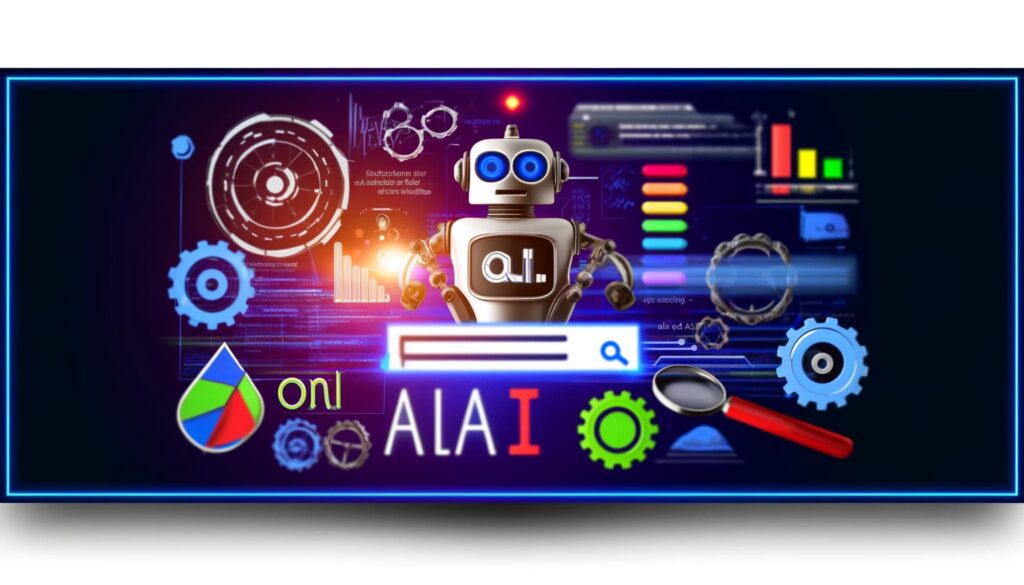Introduction

In the rapidly evolving world of digital marketing, artificial intelligence (AI) has emerged as a game-changer, especially in the realm of search engine optimization (SEO). The integration of AI into SEO practices is not just a trend but a significant evolution that offers unprecedented efficiency and insights. As businesses strive to climb the SERPs (Search Engine Results Pages), AI SEO tools have become indispensable allies, automating complex tasks and providing data-driven strategies that were once beyond human reach.
This article delves into the world of AI-powered SEO tools, spotlighting the top performers of 2024 that are reshaping how we optimize websites and content. From improving keyword research to content creation, and even enhancing site structure, these tools offer a comprehensive suite of capabilities to elevate your SEO game. We will explore each tool’s core features, pricing, and unique selling propositions to help you discern which tool aligns best with your SEO needs. Whether you’re a small business owner looking to gain an edge or an SEO professional aiming to refine your strategy, understanding these tools and their applications will provide valuable insights into the future of digital marketing.
What is AI for SEO?
Artificial Intelligence (AI) for SEO refers to the application of machine learning and intelligent automation to enhance search engine optimization strategies. AI-driven tools analyze vast amounts of data far more efficiently than humans can, identifying trends and insights that can improve a site’s search rankings. These tools can automate routine tasks such as keyword research, content generation, and link building, allowing SEO professionals to focus on strategy and creative elements that AI cannot replicate.
Benefits of Using AI Tools in SEO Strategies
The integration of AI into SEO offers several compelling benefits:
- Enhanced Efficiency: AI rapidly processes and analyzes data, delivering insights and recommendations at a speed unmatchable by manual efforts.
- Precision and Personalization: AI tools can tailor content and SEO strategies to the preferences of specific audiences, increasing the relevance and engagement of web pages.
- Predictive Insights: Leveraging predictive analytics, AI can forecast upcoming trends, enabling businesses to adjust their SEO strategies proactively.
- Continuous Learning: AI algorithms continually learn and adapt from new data, refining their predictions and strategies to improve SEO outcomes over time.
Overview of the 7 Best AI SEO Tools
As we delve deeper into the role of AI in SEO, it’s essential to spotlight the tools at the forefront of this technological revolution. Here’s a brief introduction to each of the seven top AI SEO tools that we will explore in this article:
- Surfer SEO: Optimizes content with precision using real-time data analysis.
- Ahrefs: Offers robust tools for link building and keyword research.
- Jasper: Known for generating high-quality content quickly.
- Semrush: Provides comprehensive analytics and content marketing strategies.
- Outranking: Focuses on speeding up the content creation process with AI guidance.
- Alli AI: Automates SEO tasks and provides actionable insights.
- ChatGPT: Excels in generating creative content and supporting various SEO tasks.
These tools not only streamline SEO practices but also empower marketers by enhancing their understanding of the digital landscape. The following sections will provide a detailed review of each tool, highlighting their specific capabilities and how they can be integrated into your SEO strategy.
Detailed Analysis of Each AI SEO Tool:
Surfer SEO
Overview: What is Surfer SEO?
Surfer SEO is a cutting-edge AI-driven platform designed to empower SEO specialists, content creators, and digital marketers with data-backed optimization strategies. This tool stands out for its ability to analyze and compare your content against the top-ranking pages in real-time, providing actionable insights that align with Google’s ranking factors.
Key Features:
- Content Briefs: Generates detailed content plans that include keyword usage, structure, and length, guiding writers to create optimized content.
- Keyword Research: Offers comprehensive keyword analysis to identify high-value keywords and phrases that boost SEO performance.
- Internal Linking: Automatically suggests optimal internal linking opportunities to enhance site architecture and improve page authority.
Pricing and Plans:
Surfer SEO provides a tiered pricing structure to accommodate various needs and budgets, ranging from basic plans suitable for individual bloggers to more advanced options designed for large SEO agencies. Each plan includes access to all core features with limitations on usage based on the subscription level.
How to Use:
To maximize the effectiveness of Surfer SEO, follow these tips:
- Utilize the Content Editor: Input your primary keyword into the Content Editor to receive a tailored guideline for writing or optimizing your content.
- Audit Existing Pages: Regularly use the Audit feature to identify and rectify SEO weaknesses in your current content.
- Leverage SERP Analyzer: Analyze the SERPs for your keywords to understand what works for your competitors and how you can outperform them.
Pros and Cons:
Pros:
- Provides detailed, data-driven insights that are easy to implement.
- Enhances content quality and relevance for SEO.
- Saves time in SEO planning and implementation with automated suggestions.
Cons:
- Can be costly for small businesses or individual users.
- Requires a learning curve to fully utilize all features effectively.
- May produce generic recommendations that need customization for niche markets.
Ahrefs
Overview: What Makes Ahrefs Unique?
Ahrefs is renowned in the SEO community for its comprehensive suite of tools that cater to various aspects of digital marketing, from keyword research to competitor analysis. What sets Ahrefs apart is its robust database and the precision of its backlink analysis, which is crucial for building a successful SEO strategy.
Key Features:
- Content Outline Generation: Assists in structuring effective content by providing an optimized outline based on top-performing pages.
- Title Tag Optimization: Offers recommendations to craft title tags that are both SEO-friendly and likely to increase click-through rates.
Pricing: Free Tools and Benefits:
Ahrefs includes a range of free tools, such as Ahrefs Webmaster Tools, which provides insights into website health and performance without a subscription. While comprehensive features require a paid plan, these free tools make Ahrefs accessible to those just starting or operating on a limited budget.
How to Use:
For small businesses and individuals, Ahrefs can be maximized by:
- Regularly Monitoring Backlinks: Use Ahrefs to check the quality and quantity of backlinks to ensure you’re building a healthy backlink profile.
- Conducting Competitor Analysis: Regularly check what your competitors are ranking for and adapt your strategy accordingly.
- Utilizing Keyword Explorer: Dive deep into keyword research to find lucrative keywords that can drive targeted traffic.
Pros and Cons:
Pros:
- Extensive database with accurate and up-to-date information.
- A comprehensive set of tools covering nearly every aspect of SEO.
- User-friendly interface that caters to both beginners and experienced SEO professionals.
Cons:
- Premium features come at a relatively high cost, which might be prohibitive for freelancers or smaller enterprises.
- The overwhelming amount of data available can be daunting for new users without proper guidance.
- While the free tools offer great value, they are limited in scope compared to the full suite of features.
Jasper
Overview: The Originality of Jasper’s AI Capabilities
Jasper, formerly known as Jarvis, stands out in the AI SEO tool landscape for its innovative approach to content generation. It harnesses advanced AI to produce creative and engaging content that resonates with human readers, making it a favorite among content marketers and copywriters.
Key Features:
- Content Summaries: Quickly generates concise summaries for articles, blogs, and documents, helping to encapsulate key points effectively.
- Workflow Customization: Allows users to create tailored workflows that suit their specific content production needs, enhancing efficiency and output quality.
Pricing and Access:
Jasper offers several subscription tiers, each providing different levels of access to its features. The basic plan caters to individuals and small teams, while more comprehensive plans are designed for larger organizations needing extensive content generation capabilities.
How to Use:
Maximize Jasper with these strategies:
- Utilizing Templates: Leverage Jasper’s variety of pre-designed templates for blogs, emails, social media posts, and more to streamline your content creation process.
- Integrating Extensions: Enhance your content creation workflow by integrating Jasper with tools like Surfer SEO and Grammarly, available directly through browser extensions or as part of your content management system.
Pros and Cons:
Pros:
- Exceptional at generating high-quality, creative content quickly.
- Offers extensive customization options that can integrate seamlessly into existing content workflows.
- Continuous updates and improvements in AI capabilities ensure it remains at the cutting edge.
Cons:
- Higher subscription tiers, necessary for full feature access, can be expensive.
- While Jasper excels at content creation, it requires human oversight to ensure relevance and accuracy, particularly in specialized or technical fields.
- Relies heavily on user input for best results, which may demand a learning curve for optimal use.
Semrush
Overview: Comprehensive SEO Tool Integration
Semrush is widely recognized for its extensive capabilities that encompass almost every aspect of SEO. From site audits to competitor analysis, Semrush provides an all-in-one platform that integrates seamlessly with a variety of digital marketing functions.
Key Features:
- Content Auditing: Evaluate existing content to identify SEO weaknesses and opportunities for improvement.
- Optimization and Generation: Offers tools for enhancing the SEO quality of content and generating new content ideas that are optimized for search engines.
- Integration with Other Platforms: Easily connects with Google Analytics, Google My Business, and social media platforms, streamlining various marketing efforts.
Pricing and Plans:
Semrush offers multiple subscription levels tailored to different needs, from freelancers and startups to large enterprises. Each tier includes a progressively greater range of tools and data allowances, with custom enterprise solutions available.
How to Use:
To leverage Semrush effectively:
- Regular Site Audits: Conduct frequent audits to monitor and enhance site health.
- Keyword Tracking: Use the position tracking tool to monitor keyword rankings and optimize based on performance data.
- Competitor Analysis: Regularly analyze competitor strategies to adapt and refine your SEO tactics.
Pros and Cons:
Pros:
- Robust toolset covering a wide range of SEO activities.
- Frequent updates and new features keep it at the forefront of SEO technology.
- Extensive learning resources help users maximize the platform’s capabilities.
Cons:
- The breadth of features can be overwhelming for beginners.
- High costs at advanced subscription levels may be a barrier for smaller organizations.
- Some features require a steep learning curve to utilize effectively.
Outranking
Overview: AI-Driven Content Strategy
Outranking is specifically designed to accelerate the content creation process using AI-driven strategies. It focuses on automating SEO tasks and providing actionable insights to produce high-ranking content efficiently.
Key Features:
- Keyword Research: Advanced tools for uncovering high-value keywords and search trends.
- Content Brief Creation: Automatically generates detailed content briefs that outline how to structure articles for optimal SEO performance.
Pricing and Plans:
Outranking offers pricing plans that cater to different sizes of teams and content demands, from individual content creators to large marketing departments, with scalable features across different tiers.
How to Use:
Effective ways to utilize Outranking include:
- Automate Content Outlines: Use the platform to generate content outlines quickly, ensuring all SEO elements are covered.
- Streamline Workflow: Set up automated workflows to consistently produce SEO-friendly content with less manual input.
Pros and Cons:
Pros:
- Greatly reduces the time needed to research and create SEO-optimized content.
- User-friendly interface makes it accessible to those new to SEO.
- Customizable features adapt to various content needs.
Cons:
- More effective for larger teams than solo users due to its team-oriented features.
- May require initial training to best utilize all available tools.
- Subscription costs may be prohibitive for smaller operations or freelancers.
Alli AI

Overview: AI for On-Page and Technical SEO
Alli AI is designed to revolutionize on-page and technical SEO by automating complex optimizations. This tool leverages artificial intelligence to provide actionable recommendations that enhance site performance and search engine visibility.
Key Features:
- Schema Markup: Automatically generates and implements schema markup to improve search visibility and click-through rates.
- A/B Testing: Facilitates SEO experiments to determine the most effective strategies for your site.
- Site Speed Optimization: Provides insights and actions to improve page loading times, a critical factor in SEO and user experience.
Pricing and Trials:
Alli AI offers a variety of pricing plans tailored to the needs of different businesses, from small startups to large enterprises. Potential users can start with a free trial to test the platform’s capabilities before committing to a subscription.
How to Use:
To maximize the effectiveness of Alli AI:
- Implement Recommendations: Regularly apply AI-driven suggestions for on-page optimizations and technical enhancements.
- Monitor Performance: Use Alli AI’s dashboard to track changes in SEO performance following the implementation of recommendations.
- Iterate and Optimize: Continuously use the A/B testing feature to refine strategies and improve results over time.
Pros and Cons:
Pros:
- Automates many time-consuming SEO tasks, allowing teams to focus on strategic decisions.
- Customizable recommendations suit a variety of SEO needs and niches.
- Regular updates ensure the tool keeps pace with search engine algorithm changes.
Cons:
- The effectiveness of automated recommendations may vary depending on the complexity of the site.
- Pricing can be steep for smaller businesses or individual practitioners.
- Requires a level of SEO knowledge to effectively implement and benefit from the tool’s full capabilities.
ChatGPT
Overview: Free AI Tool with Wide Applications
ChatGPT, powered by OpenAI, is a versatile and free AI tool that assists with various content-related tasks in SEO, from writing to metadata creation. Its ability to understand and generate human-like text makes it an invaluable asset for enhancing content strategy.
Key Features:
- Content Outlines: Quickly generates structured outlines to guide content creation.
- Meta Descriptions: Produces concise and compelling meta descriptions tailored to improve SERP click-through rates.
- Schema Markup: Helps create structured data to enhance SEO and content discoverability.
How to Use:
Leveraging ChatGPT effectively involves:
- Extending Functionality: Enhance capabilities by integrating ChatGPT with browser extensions and other SEO tools.
- Content Development: Use generated outlines and descriptions as a base to build more detailed and personalized content.
- Prompt Engineering: Craft detailed prompts to guide ChatGPT in producing more targeted and relevant outputs.
Pros and Cons:
Pros:
- Free to use, offering significant value without investment.
- A broad range of applications from technical SEO to creative content generation.
- Continuously improving through updates in AI technology.
Cons:
- Outputs require human oversight to ensure accuracy and relevance, especially in specialized fields.
- May not always adhere strictly to SEO best practices without specific guidance.
- The tool’s broad capabilities can sometimes result in generic content that lacks a personalized touch.
How to Use AI for SEO in 2024
As the digital landscape becomes increasingly complex, integrating AI tools into SEO strategies is not just beneficial but essential. These technologies offer powerful ways to enhance efficiency and precision in SEO tasks.
General Strategies for Integrating AI Tools into SEO Workflows:
- Start with Data Analysis: Use AI to gather and analyze data about your site’s performance, competitor activities, and market trends.
- Automate Routine Tasks: Employ AI for tasks like keyword research, competitor analysis, and SEO reporting to save time and reduce human error.
- Enhance Content Strategy: Leverage AI to identify content gaps, suggest topics that resonate with your audience, and optimize content for user intent and readability.
Specific Examples of Using AI in SEO:
- Generating Tags and Metadata: AI tools can automatically generate SEO-friendly tags, meta titles, and descriptions that are optimized for search engines.
- Keyword Research and Ideas: Utilize AI to uncover emerging keywords and long-tail phrases that can attract more specific, targeted traffic.
- Auditing Content: Implement AI-driven tools to audit your website content comprehensively, identifying issues and opportunities for optimization.
Common Challenges and How to Overcome Them
While AI in SEO offers numerous advantages, it also comes with challenges that need careful management:
Over-Optimization: AI tools may push the limits of SEO optimization, leading to content that feels unnatural or penalized by search engines.
- Solution: Balance AI recommendations with user-focused writing. Prioritize readability and user engagement alongside technical SEO aspects.
Reliance on AI Without Oversight: Over-reliance on AI can result in missing nuanced insights or errors that only human review can catch.
- Solution: Always review and modify AI-generated content or strategies. Use AI as an assistant rather than a replacement for human decision-making.
Best Practices for Blending AI Tools with Human Insight:
- Set Clear Objectives: Define what you aim to achieve with AI in SEO—be it improving content quality, increasing traffic, or enhancing site architecture.
- Choose the Right Tools: Select AI tools that align with your specific needs and integrate well with your existing tools and workflows.
- Continuous Learning and Adaptation: Stay updated with the latest AI developments and continuously train your team to leverage these tools effectively.
- Quality Assurance: Implement routine checks and balances where human experts review AI outputs for accuracy, relevance, and alignment with SEO goals.
By understanding how to effectively integrate AI with human expertise, SEO professionals can harness the full potential of both worlds to drive superior results in 2024.
Integration with Other Technologies
As the digital ecosystem becomes increasingly interconnected, the ability of AI SEO tools to integrate with other technologies becomes crucial for a streamlined and effective marketing strategy.
Cross-Platform Compatibility
AI SEO tools are designed to work seamlessly with various platforms and technologies, enhancing their utility and effectiveness:
- CRM Systems: Integration with Customer Relationship Management (CRM) systems allows for a more personalized SEO strategy by leveraging customer data to tailor content and optimization efforts.
- Social Media Platforms: By syncing with social media platforms, AI tools can analyze social signals and trends to inform content creation and distribution strategies that boost SEO.
- Analytics Tools: Connecting AI SEO tools with analytics platforms enables a deeper analysis of website performance data, helping refine SEO strategies based on user behavior and engagement metrics.
API Access and Custom Development
The availability of API (Application Programming Interface) access in AI SEO tools opens up vast possibilities for customization:
- Functionality Extension: APIs allow users to extend the capabilities of AI tools, integrating them with custom applications or existing systems to meet specific SEO needs.
- Custom Integrations: Developers can use APIs to build custom solutions that automate and enhance SEO tasks, from data collection to content generation and performance tracking.
Advanced Use Cases
AI SEO tools also cater to more sophisticated needs that anticipate the future directions of search technology:
Voice Search Optimization
With the proliferation of voice-activated devices, optimizing for voice search is becoming increasingly important:
- AI tools analyze voice search queries to understand natural language patterns and user intent, enabling the creation of content that aligns more closely with how people speak rather than type.
Predictive Analytics
Predictive analytics in AI SEO tools allows businesses to stay ahead of the curve:
- By analyzing historical data and current trends, these tools can forecast future changes in user behavior and search engine algorithms, providing recommendations for preemptive strategy adjustments.
User Experience and Interface
In the realm of AI SEO tools, user experience (UX) and interface design are pivotal for ensuring that the technology is accessible and effective for users of all skill levels.
Ease of Use
- Dashboard Design: A well-organized dashboard is crucial for users to quickly find the features they need. Effective AI SEO tools are characterized by intuitive layouts that simplify complex data into understandable insights.
- Ease of Navigation: Navigation should be straightforward, allowing users to seamlessly move between different features without confusion, enhancing the overall efficiency of the SEO process.
- Accessibility: Accessibility is key, ensuring that tools can be used by a wide range of individuals, including those with disabilities. This includes clear labeling, voice commands, and compatibility with screen readers.
Training and Support
- Training Materials: Comprehensive training materials such as video tutorials, webinars, and written guides are essential for helping users understand how to use AI SEO tools effectively.
- Customer Support: Robust customer support, including live chat, email support, and community forums, plays a critical role in assisting users with any technical issues or queries they may have, thereby maximizing their SEO outcomes.
Ethical and Privacy Considerations
The deployment of AI in SEO also brings to light important ethical and privacy issues that need to be addressed transparently.
Data Privacy
- AI SEO tools often handle sensitive data, making data privacy a significant concern. These tools must comply with international regulations such as the General Data Protection Regulation (GDPR) to protect user information from misuse.
- Transparency in Data Usage: Users should be informed about how their data is being used, who has access to it, and how it contributes to the tool’s SEO suggestions.
Bias in AI
- Identification of Bias: AI systems can inadvertently perpetuate biases present in their training data, which could skew SEO strategies unfavorably. Recognizing and addressing these biases is crucial for maintaining the integrity and effectiveness of AI-driven SEO.
- Mitigation Strategies: Leading AI SEO tools now incorporate methodologies to detect and mitigate bias, such as diverse data sets and algorithm auditing, to ensure fair and unbiased SEO recommendations.
Case Studies and Examples

Understanding the practical application and effectiveness of AI SEO tools can best be achieved through real-world examples and comparative analyses.
Real-World Success Stories
- E-commerce Growth: A mid-sized e-commerce platform utilized Surfer SEO to optimize its product descriptions and blog posts. Within six months, they saw a 45% increase in organic traffic and a 20% increase in sales, demonstrating the direct impact of optimized content on SEO performance.
- Local Business Visibility: A local bakery employed Ahrefs to enhance their local SEO strategy by identifying and targeting location-specific keywords. This approach resulted in a 30% increase in local search visibility and a 25% uptick in foot traffic.
Comparative Case Analysis
- Tool Efficiency in Competitive Niches: An SEO agency conducted a study comparing the keyword optimization effectiveness of Jasper and Semrush for clients in highly competitive industries. The analysis showed that while both tools significantly improved search rankings, Jasper was particularly effective for creative content generation, whereas Semrush excelled in comprehensive site audits and backlink analysis.
Call to Action
Maximize your SEO efforts by exploring these powerful AI tools. Visit the websites of Surfer SEO, Ahrefs, Jasper, Semrush, Outranking, Alli AI, and ChatGPT to access demos or sign up for free trials. Discover which tool aligns best with your business needs and start transforming your SEO strategy today.
Engage with Us
Have you used any of these AI SEO tools? Share your experiences in the comments below or on our social media platforms. Your insights could help others optimize their SEO strategies and achieve better results. Let’s learn and grow together in the ever-evolving world of digital marketing!
Conclusion
Throughout this exploration of the top AI SEO tools of 2024, we’ve uncovered how technologies like Surfer SEO, Ahrefs, Jasper, Semrush, Outranking, Alli AI, and ChatGPT can significantly enhance SEO strategies. Each tool offers unique features—from content generation and keyword research to technical SEO and predictive analytics—that can dramatically improve your digital marketing efforts.
The integration of AI into SEO not only simplifies and streamlines many of the complexities associated with search engine optimization but also provides deeper insights into content performance and user engagement. Whether you’re looking to refine your content, expand your keyword strategy, or enhance your site’s technical compliance, there’s an AI tool designed to meet those needs.
As the digital landscape continues to evolve, staying ahead means being adaptable and innovative. Therefore, I encourage you to experiment with these AI SEO tools. Many offer free trials or demos, providing a perfect opportunity to see which tool aligns best with your specific requirements and goals. Embrace the potential of AI to transform your SEO approach, drive better results, and achieve a competitive edge in your market.
In the end, the right tool is the one that fits seamlessly into your workflow, enhances your efficiency, and most importantly, improves your site’s visibility and ranking. Dive in, explore, and discover how these AI-driven solutions can revolutionize your SEO strategy.











